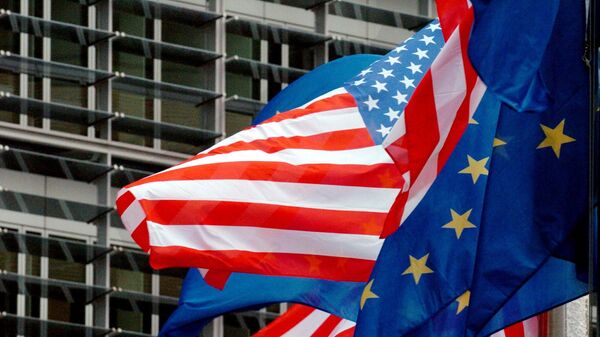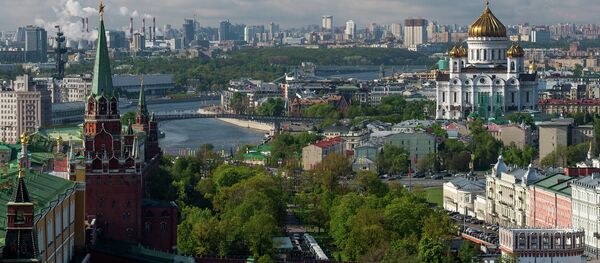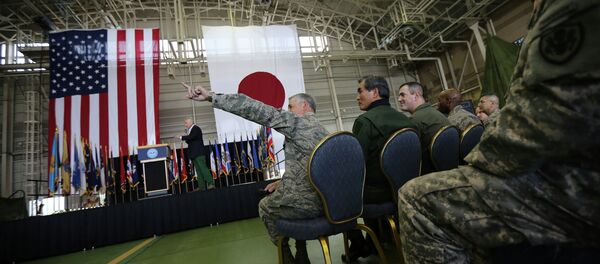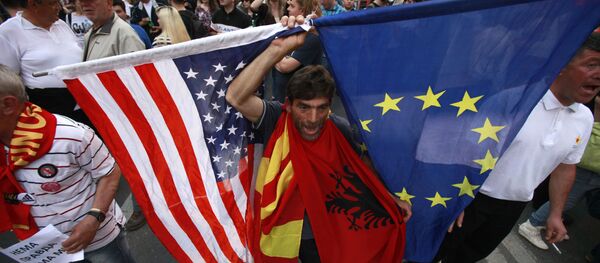MOSCOW (Sputnik) — An IFOP poll for Sputnik has shown that over 40 percent of French, Germans and Poles think that the United States is influencing elections in other countries, while fewer than 30 percent among them believe that Russia is meddling in other states' votes.
Surprising Result
George Szamuely, a senior research fellow at the Global Policy Institute of London Metropolitan University, has found it surprising that so many Europeans have been able to resist constant media reports on Russian interference and to identify the United States as one of the main actors influencing other countries' affairs.
"It's pleasantly surprising that after this barrage of propaganda that has been going on for something like 18 months about supposed Russian interference, Russian control over elections in innumerable countries, the public seems distinctly underwhelmed by the propaganda and is actually expressing the sensible position that the United States of course exerts far greater influence on countries' elections than Russia does, and has a long history of this, going back to the 1940s, in Italy," Szamuely told Sputnik.
"The United States has undoubtedly been interfering in other states' affairs more than anyone since the end of the World War II and up to the present. The fact that only 40 percent understand this shows a disturbing level of disinformation in the society," Boron told Sputnik.
"This particular propaganda must not be working well, if the respondents believe that the United States is influencing the elections in other countries more than the Russians," Lefebure told Sputnik.
Anti-Russian Bias
According to Szamuely, the media bias against Russia was quite real, with US media regularly churning out stories about "the wicked Russians."
"There's enormous bias. This bias has reached almost historic proportions," Szamuely said.
Yang Mian, a professor with the Communication University of China, said that the alleged Russian interference in the US elections became a hot topic in the media over the last several months following the latest election.
"However, nobody has so far proven that Russia has influenced the result of the US elections or that Russian state agents have been involved in hacker attacks," the expert said.
Moscow has denied all accusations, pointing out that the claims have remained unsubstantiated.
Soft Power: Internet, Cinema, NGOs
According to French historian Antoine Lefebure, the US influence has a wider reach than Russia's, including, above all, the internet and other technologies created and developed in the United States, as well as other "soft power" techniques.
"It also concerns cinema and television. The United States has a significant soft power," the expert told Sputnik.
Lefebure added that the United States began building up its influence after the World War II, and people have grown used to it.
Lefebure noted, however, that a new tendency to criticize the United States more has appeared following the election of Donald Trump as president.
According to Szamuely, there is "a long record of American interference, not to mention all the NGOs that are financed lavishly by the US government."
Yang told Sputnik that the United States had repeatedly influenced other countries' elections.
"The United States uses various governmental and non-governmental organizations to interfere in other countries' affairs," the expert said.
German Election
Friedhelm Klinkhammer, former chair of one of the branches of German trade union ver.di, believes that many prominent German journalists are supporting the United States, especially members of the Atlantic Bridge non-profit association, aiming to promote US-German understanding.
Klinkhammer pointed out that German media avoided criticizing Chancellor Angela Merkel in the run-up to the recent election, adding that, given reports of US surveillance and monitoring of the top German officials, it would be hard not to suspect the United States of swaying the elections in its own favor.
Dr. Martin Thunert with Heidelberg Center for American Studies is more skeptical about the US role in September election.
"If the United States had really used manipulation in this issue, Merkel would have fared better, I think," Thunert said.
The expert, who has attended the Atlantic Bridge meetings, said that the journalists present there would not blindly follow someone's orders and this organization is unlikely to have influenced the German election.
Merkel's Christian Democratic Union allied with the Christian Social Union secured a larger percentage of the vote than other parties, but ended up losing 65 seats in the Bundestag.








